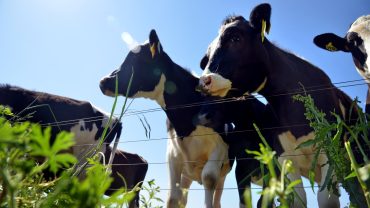Animal Science
The Master of Animal Science nonthesis degree program is designed to give students a deeper academic background in sub-disciplines associated with the field of Animal Science which include nutrition, physiology, genetics, biotechnology and animal management. This program is a distance education version of the Master of Animal Science degree. Please visit the department website for current admission requirements and curriculum information.
Eligibility
Applicants should have an undergraduate degree in Animal Science or a related field, with a competitive GPA (3.0 or higher). Prerequisites include a background or coursework in physiology, chemistry, biochemistry, and genetics. Factors considered in the evaluation of applications for full admission include, but are not limited to:
- Grade point average
- GRE scores
- TOEFL scores (international applicants only)
- Letters of recommendation
- Additional information that reflects the potential of the applicant for academic excellence
International students: Your TOEFL score must be a minimum of 80 with a score of 18 in each category with no appeals. Please visit the NC State University policy regarding TOEFL scores.
Plan of Study
A student has six years to complete the master's program starting with the first course that is to be counted. Students may be part-time or full-time.
NOTE: Unlike the on-campus MAS program, the distance education version of the MAS program does not require the student to spend any time in residence on campus at NC State University; rather, the program may be completed with online classes only.
Career Prospects
Master of Animal Science program graduates find employment in agriculture, industry, teaching and government. Some use their extensive knowledge to become educators, either as extension agents or farm management educators, or as instructors in community colleges or secondary school teachers. Others provide expert advice regarding animal husbandry techniques or sustainable animal product development. From feed research and development to agricultural education and policy, animal science experts are in demand.
While a bachelor's degree may be enough to qualify for entry-level work, most animal scientists have a master's degree or a doctorate. A graduate degree opens the door to opportunities that otherwise would not be accessible.


